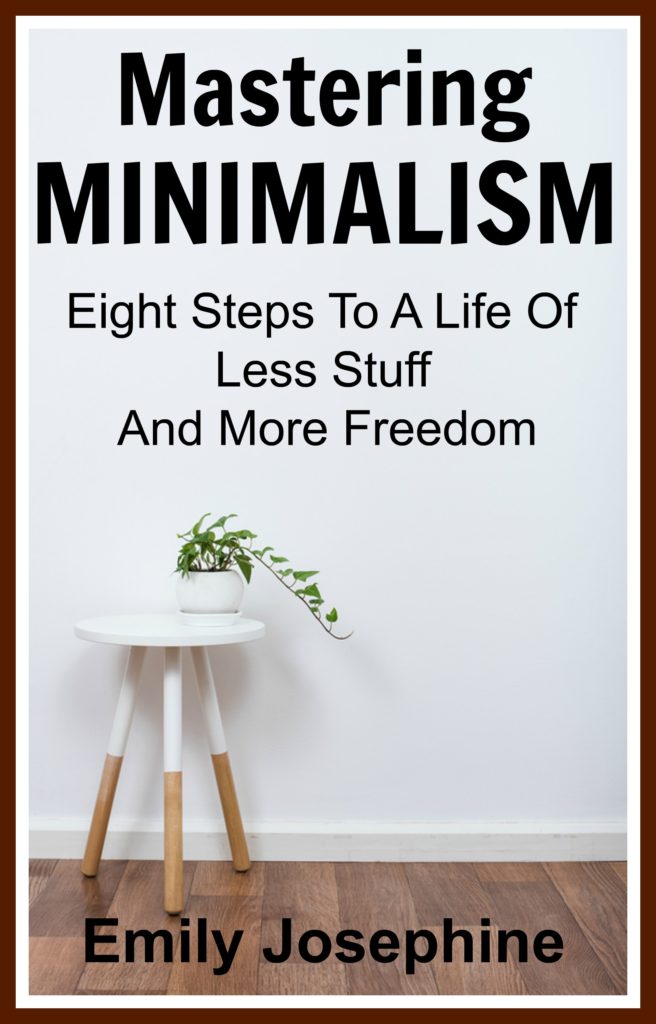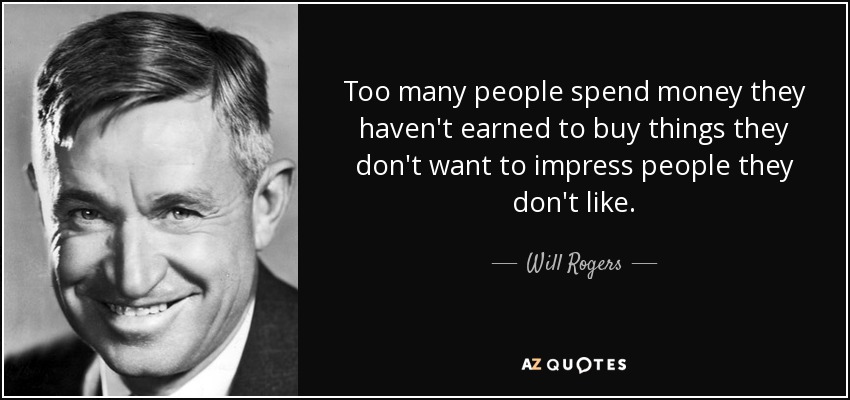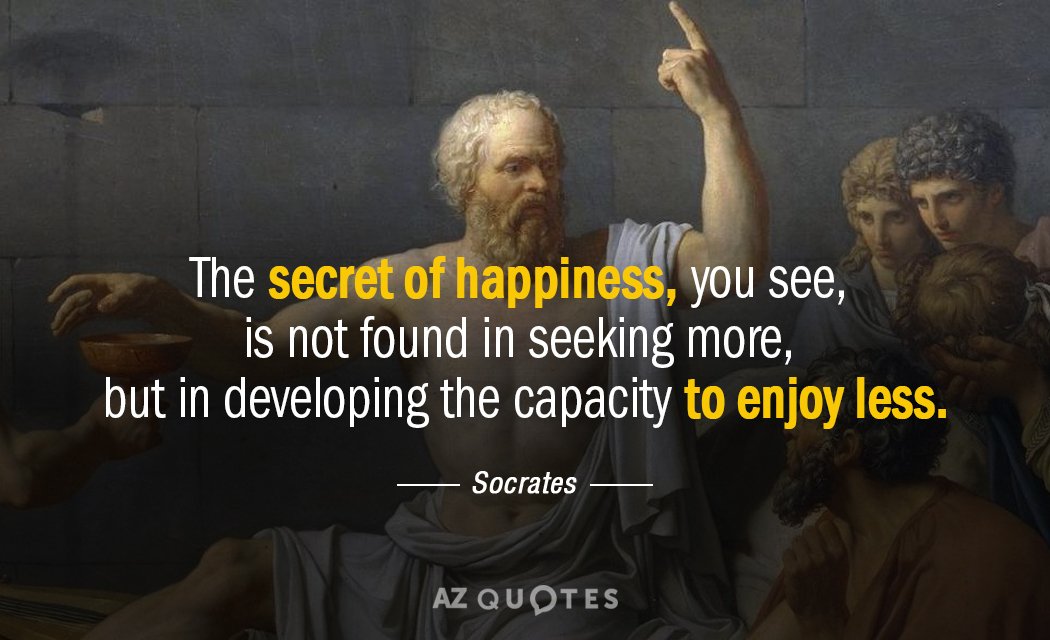Click here to return to Blog Post Intro

How does Minimalism help save the planet?
- The fewer things you buy, the fewer things are manufactured, and thus the fewer of the planet’s natural resources are used and less pollution is produced.
- Most of what is sold in stores – except for that occasional store that sells only fair-trade goods – is made by people working for unfair wages in dangerous working conditions. The American greed for cheap and numerous things has perpetuated inhumane treatment of our fellow human beings.
Why does owning more material goods diminish your freedom?
- The most obvious is that more material goods equals less money in your pocket, which leads to less financial freedom. In fact, for most Americans it leads to debt.
- The more stuff you have, the more time you must take to watch over your stuff.
- A less obvious effect of simplification is more mental and emotional freedom. Do you have in your house a junk drawer, and/or a closet in a spare room which collects miscellaneous items? How do you feel whenever you open that drawer, or door to the closet?
- See? To live minimally leads to greater mental and emotional freedom, because you don’t have to deal with great (or even small) piles of junk.
Josephine explains, “A few years ago, my family made a major lifestyle change that required us to get rid of over half of our household possessions – wall art, books, clothing, furniture, knick-knacks, dishes, you name it. Now, I find myself not caring very much about things.”
8 Steps to a Life of Less Stuff and More Freedom
Step One: Love Yourself & Others
Above all else, if you are going to master Minimalism, you need to learn to love.
Without love, Minimalism becomes just another religion to follow. You will end up being bogged down by rules and feeling guilty when you know you’re not measuring up. And you will never measure up.
Whom do you need to love? Love yourself. In the Bible, Jesus admonishes us to “love your neighbor as you love yourself.” In other words, you have to love yourself first or you cannot love your neighbor. You have value, much more value than you can conceive. Your existence makes a difference in the world. God created you because He wanted you. Therefore, God loves you beyond what you can imagine.
Love others: learning to love other people – even our enemies – is essential to living a minimalist lifestyle. Love for others is the foundation of true Minimalism.
Here are some tips to help you open your heart.
- The act of forgiveness leads to miracles. Forgiveness is, in short, a release from a prison that you threw yourself into.
- See the other side. Most of the time, if someone is acting like a jerk it’s because they’re having a hard time with life at that moment.
- Pray for people you don’t like.
- Practice kindness. Open and hold doors for perfect strangers. Do a chore for your spouse.
Step Two: More Stuff, Or More Life?
In the book Your Money Or Your Life by Vicki Robin and Joe Dominguez, the authors explain how money equals your life energy. The money you earn is earned by you expending your life. Therefore, the things you own – unless given to you by others – are gained by your expending your life. That sounds kind of harsh, doesn’t it? You never hear marketers say, “Buy the latest iPhone, and shave five years off of your life!”
What Robin and Dominguez are doing is trying to get their readers to see that we spend most of our time at jobs we don’t like just so we can keep up with the Joneses. If we didn’t “need” so much in the way of material things, our lives would be much less stressful.
The fact is, we would all be a lot happier and healthier if we would pare our needs and wants down to a fraction of what they are now, and then only work enough to pay the bills, plus have a couple hundred extra dollars a month to invest in case we ever get to a point where our physical bodies will no longer allow us to work and we have no one to take us in.
It’s about learning to be happy with less because the things you own represent your life energy. Are they really worth it?
When you awaken to the fact that your desire for things is slowly killing you – as well as stealing away a comfortable life in your old age – you begin to make choices that improve your health and well-being.
Step Three: Realize that Consumerism Hurts Other Human Beings
Have you considered the exploitation of human labor? Did you know that the clothes you buy in most any store were made by people being paid pittance and working in dirty – even dangerous – conditions…and that many of those people were children?
If you don’t care about what your greed is doing to the rest of the world, you won’t change.
Get a revelation about what your wants are doing to other people on the other side of the globe!
Step Four: Set Your House on Fire
OK, not really…but ruthlessly declutter, as though your house had burned to the ground!
You can reduce clutter in a much less drastic way that will not land you in prison.
You may have heard of the three bags/boxes system, where you have one bag for the things you’re going to keep, one for the things you’re going to donate to charity, and one for trash. Here are some rules of thumb for decluttering:
- Start to change your perspective. Things are just things. They are not memories, they are not the people who gave them to you. Unless you bought them fewer than six months ago, they no longer have the monetary value that they did when you bought them.
- Set a time to begin decluttering.
- Get together your three bags and boxes (for keeping, giving away, and tossing). Some professional organizers allow you to have an extra container for things you’re not sure about.
- Start small. Start with a closet or junk drawer.
- Be ruthless.
Step Five: No More Plastic Money!
Cut up your credit cards. If you don’t, you will get tempted to buy things you don’t need. Studies have even shown that people who pay cash for everything they buy spend less money.
Your brain makes the connection between the emptier wallet and the thing you just bought, and it pinches.
You may be responding, “But I promise I’ll pay off the bill at the end of every month.” Josephine agrees that one credit card is appropriate under the following circumstances: You are naturally frugal AND you have always paid credit card bills before their due date.
“But what about emergencies?” If you’re serious about mastering Minimalism, by this point you should always have money leftover at the end of the month. In other words, you should be debt-free except for possibly a mortgage. If you’re not, you need to work the debt snowball, which is the most effective way for getting out of debt as quickly as possible. Before working the debt snowball, you should have created an emergency fund.
Use the money in your emergency fund—not a credit card—to pay for emergencies.
Step Six: Wait, Wait, Then Wait Some More
Minimalism is about getting out of the consumerism mindset and being cautious and conscientious about what you buy. It does not mean never being a consumer again. One of the best ways to be a conscientious consumer is to wait a month before buying anything.
When you see something that you really want to buy, but don’t really need, wait a month. Even if the item is still available after that period, one of two things will probably have happened:
- You will have forgotten the thing even exists, or
- You will have trouble remembering why you wanted the thing so desperately in the first place.
For some people, a week is sufficient time before deciding to buy something. You can try that, but if you find yourself still wanting most things after seven days, wait out the entire month.
Step Seven: Follow the One In, One Out Rule
Every time something new enters your house, you give away, throw away, or sell a similar item.
Some minimalist couples/families do one in, two out. Either way, you will prevent collecting clutter. You may even end up getting the new items at a discount if you can sell the old ones.
Step Eight: Create Systems to Help Your Days Flow More Smoothly
Set up systems. In other words, systemize as many aspects of your life as possible, and life will not only be simpler, but you will also save money by planning ahead.
Consider these tips for food and meals:
- Eat simply and healthy. Check out Josephine’s book Simple Diet, Beautiful You.
- Create a master shopping list.
- Schedule one day a week to grocery shop.
- Plan one to two week’s worth of meals.
- Use the master shopping list and the meal plans to write out the next grocery list.
For Bills, paying straight from your bank account is the simplest bill-paying system a minimalist could ask for!
Systemize your chores – whatever they are – however you can. Have a schedule and train yourself to follow it as best you can. In addition, have a place for everything, and everything in place, so that you never waste time looking for the items required to do your chores.
Establish routines in your day wherever they make sense. One critical routine that many people ignore is planning the next day the evening before.
When you develop systems, you will get into habits and routines that will help you save money, reduce your stress, and even need less stuff.



